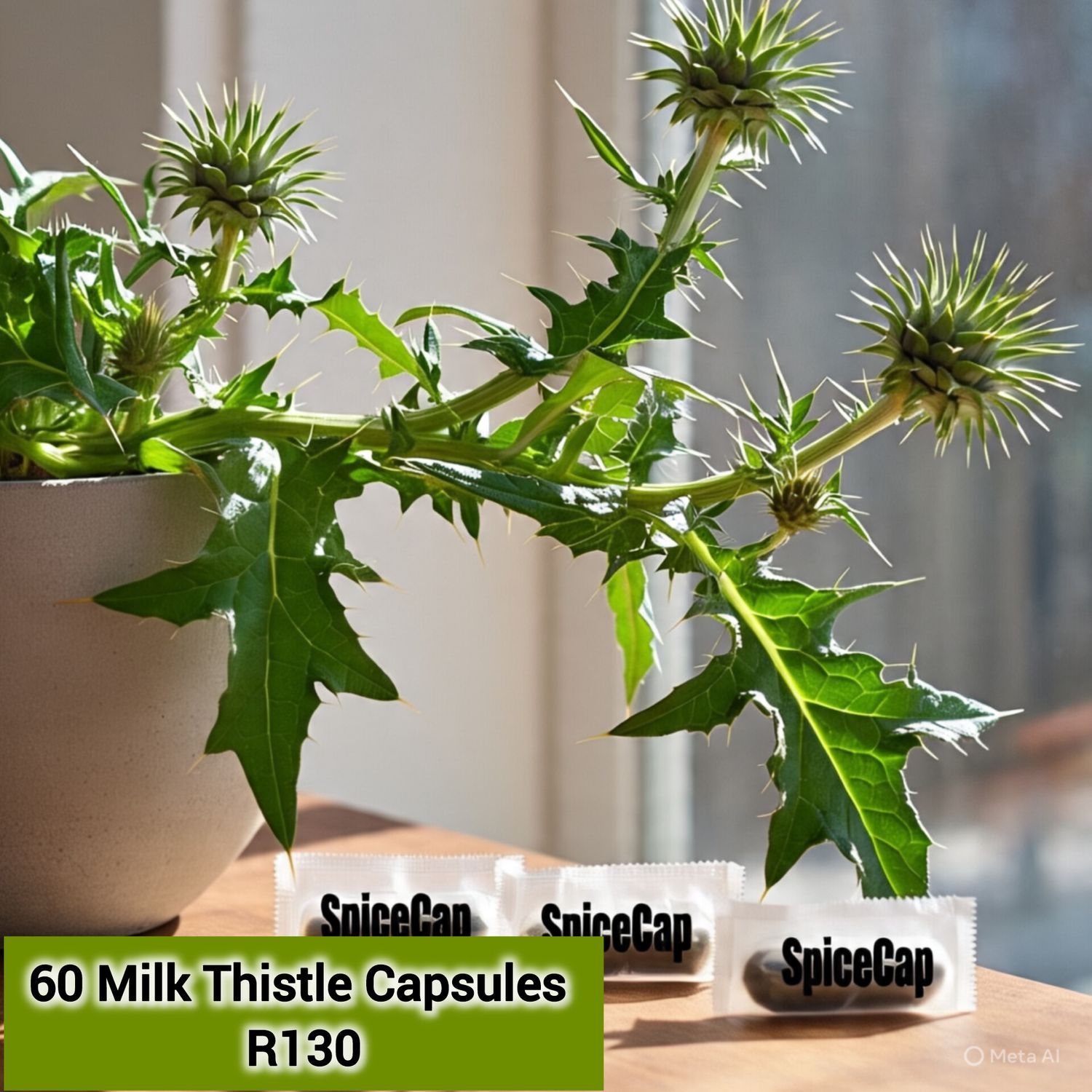60 x Milk Thistle Capsules
Milk thistle’s long-standing use in traditional and folk medicine has ignited considerable scientific interest.
Increasingly more milk thistle research is being conducted, and studies consistently show that silymarin, a bioactive flavonoid complex derived from the seeds of milk thistles, can positively affect various physiological functions.
Here are six science-backed benefits of milk thistle.
1. Promotes liver health
Silymarin is a complex of flavonoids, including silybin, silydianin, and silychristin, with several potential benefits for liver function.
The liver is responsible for metabolizing and detoxifying metabolic by-products, hormones, alcohol, drugs, toxins, and heavy metals, which generates reactive oxygen species (ROS) and oxidative stress.
ROS are volatile molecules that can damage liver cells and cause liver inflammation, which impairs normal liver function and increases the risk of metabolic disorders, liver cancer, and cirrhosis.
Evidence published in Annals of Medicine suggests that silymarin has potent antioxidant properties that can neutralize ROS, which protects from liver damage, enhances detoxification processes, and promotes overall liver function.
Because of its ability to protect liver cells from oxidation, taking milk thistle may be particularly beneficial for individuals with fatty liver and alcoholic liver disease, which are health conditions characterized by elevated ROS levels and liver inflammation.

2. Strengthen liver cells
Not only does milk thistle promote healthy liver function, but it’s also believed that silymarin can help regenerate liver tissue.
Silymarin may increase DNA and protein production in hepatocytes, which strengthens the outer membrane of liver cells and stimulates the regeneration of liver tissue.
A study published in Advances in Therapy confirms the benefits of milk thistle for liver regeneration and concludes, “Treatment with silymarin should be initiated early in patients with fatty liver disease, chronic hepatitis, and acute liver failure when the regenerative potential of the liver is still high.”
3. May improve insulin resistance
Increasingly more evidence suggests that milk thistle may be a natural way to promote balanced blood sugar levels and metabolic health.
The liver plays a critical role in glucose metabolism and blood sugar regulation, and poor liver function and inflammation can contribute to insulin resistance, the primary cause of diabetes.
Milk thistle promotes overall liver function linked to enhanced cellular sensitivity to insulin, which is essential to maintaining blood sugar balance.
In addition, silymarin has powerful anti-inflammatory effects that inhibit certain proinflammatory molecules linked to insulin resistance, which explains why milk thistle can help lower blood sugar levels and reduce the risk of diabetes.
Evidence published in Annals of Hepatology reports that silymarin treatment improved insulin resistance and several other metabolic health markers in patients with fatty liver disease.
4. Potential anti-cancer properties
According to research published in the Journal of Evidence-Based Integrative Medicine, milk thistle may reduce the risk of liver cancer.
“Because of its role in metabolism and detoxification, the liver is exposed to elevated levels of ROS and inflammation,” explains Dr. Berg. “This can damage DNA and impair cellular repair mechanisms linked to an increased risk of cancer development.”
Silymarin has antioxidants and anti-inflammatory properties that protect the liver from ROS and has been found to directly inhibit the growth and proliferation of cancer cells in liver tissue.

5. Supports vascular function
Evidence published in Pharmaceutical Biology suggests that silymarin enhances the production and activity of nitric oxide, a potent vasodilator that promotes cardiovascular health.
Nitric oxide promotes vascular health by relaxing blood vessels, which improves blood flow and regulates blood pressure.
Because of its role in maintaining vascular tone, nitric oxide helps lower the risk of hypertension, varicose veins, atherosclerosis, and stroke.
6. Promotes bile flow and gallbladder health
Bile is produced in liver cells and stored in the gallbladder and plays a crucial role in the digestion and absorption of dietary fats and fat-soluble vitamins.
Optimal gallbladder function is closely connected to liver health, and various studies have shown that milk thistle supports liver function, which is vital for adequate bile production and gallbladder health.
In addition, silymarin’s anti-inflammatory effects may help reduce gallbladder inflammation, which lowers the risk of gallstones and other gallbladder issues.
Watch the video below to learn more about the amazing benefits of milk thistle for liver health.
Milk Thistle: The Amazing Herb for Your Liver

